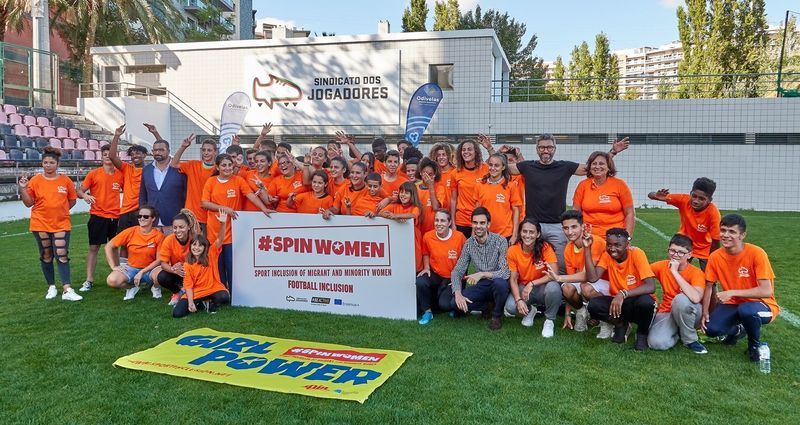Looking at society at large, migrant and ethnic minority women are belonging to the most vulnerable groups in Europe. The SPIN Women project aims to show the different perspectives of migrant and ethnic minority women and to develop strategies to increase their involvement in sports.
Preliminary results and experiences of the seven project partners who run the ERASMUS+ sport project SPIN Women, standing for “Sport Inclusion of Migrant and Minority Women – Promoting sports participation and leadership capacities”, are now documented in an Evaluation Inception Report. The report covers the first year, 2019.
Monitoring, Evaluation and Learning
The organisation Huis voor Beweging / Sport-Action-Education based in Arnhem, Netherlands has been commissioned by the coordinating organisation fairplay at the VIDC to conduct an external evaluation of the two years’ project.
The approach applied for the monitoring and evaluation of the SPIN Women project consists of three elements, which is Monitoring, Evaluation and Learning (MEL). According to the researcher Willie Westerhof “Learning is the most important aspect or goal of the monitoring and evaluation process. The aim of MEL is to improve the way that we do things during the implementation of the SPIN Women project, rather than changing things radically”.
Inclusive European Week of Sport Events
To highlight only one activity of the ongoing project, the “Sport Inclusion Events” during the European Week of Sport (EWoS) in September 2019 have been a great success and a learning experience. During EWoS the partner organisations in the seven project countries (Germany, Finland, Hungary, Ireland, Italy, Portugal, Austria) organised a total of 13 different sports events, which aimed at increasing the participation and inclusion of refugees, in particular women and girls.
With the target group we held one round table discussion, the other twelve events consisted of sports activities, some of them with side events. In the preparation and implementation of activities, there was mainly cooperation with sports organisations (7x), migrant organisations (5x), educational institutions (4x) and municipalities (3x), project organisations (2x), reception centres (2x) and combinations of these organisations. Role models (female top athletes) took part at two events.
In total around 840 participants took part in the actions and events. Of this group, 33% were female, 59% belonged to the target group of migrants, refugees and minorities.
Experiences of the participants
During the EWoS events, 32 participants were interviewed about their experience with sports, about the importance of sports in their lives and about their satisfaction with the event itself. 30 of the interviewees were female. Their age varied between 10 and 57 years. Most were teenagers and twens (69%). They had many different countries of origin, including Turkey, Eritrea, Ivory Coast, Serbia, Nigeria, Syria, Iran, Congo, Mali, Kenya, Burkina Faso, Romania, Somalia and Ecuador.
Seven interviewees (22%) had never participated in sports, 21 people (66%) had gained experience with sports in the past. Eight participants (25%) indicated that they are currently not involved in any sports or exercise.
When asked whether these EWoS events or sports in general are important in their lives, 30 (94%) interviewees answered ‘yes’. One of the interviewees, who answered the question with ‘no’, declared her answer with “Not [only] important, but essential for survival”. So actually 97% think sport is very important for them.
Ongoing project
Due to the Covid-19 crisis planned activities of the SPIN Women project had to be postponed, for example the international meeting “Strengthening ethnic minority women in football” which was due to take place in Lisbon at the end of April 2020. Project partners will resume events such as national stakeholder meetings as soon as it will be possible.
The full Evaluation Inception Report can be downloaded here.
